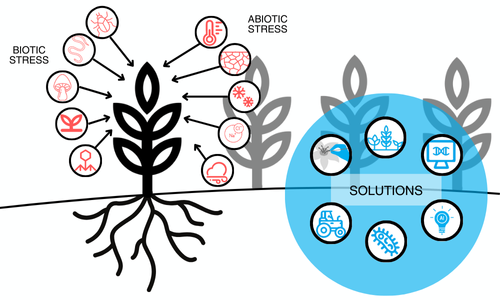|
Computomics blog S1E8 - Under pressure: breeding resilience for all seasons Germany Breed, Sow, Grow: Adventures and Challenges in Plant Breeding In our previous blog episode, we talked about selection intensity. Today, we will get an overview of plant stressors and how to manage them. Let's dive into "Under Pressure: Breeding Resilience for all Seasons". Understanding Plant Stress Plants, like humans, face challenges that threaten their health and growth. Understanding these stresses and their impact is crucial, particularly as climate change amplifies their intensity. In this blog episode, we look closer into how to equip our crops to withstand these pressures. The challenges that affect plants are broadly classified into two categories: biotic and abiotic stress.
The Role of Climate Change Climate change exacerbates these stresses, making them more severe and unpredictable: Heat stress: Rising temperatures and more frequent heatwaves damage plant cells and reduce photosynthesis, stunting growth and lowering yields. Water-related stress: Longer droughts lead to water shortages, while intense rainfall causes flooding, soil erosion, and nutrient depletion. Flooding suffocates roots and washes away vital nutrients, significantly impacting plant health and productivity. Pests and pathogens: Changing climates create favorable conditions for pests and diseases in regions where they previously could not survive, increasing biotic stress on crops.
The Role of Plant Breeders In agriculture, biotic and abiotic stresses can drastically reduce yields, lower crop quality, and drive up costs for pest control and irrigation significantly, threatening food security and farmers' livelihoods. Plant breeders play a pivotal role in addressing these challenges by:
Farmers can manage these biotic and abiotic stresses by adopting resistant varieties, integrated pest management, efficient irrigation, and crop rotation. Tools and Technologies for Modern Plant Breeders To breed resilient crops, plant breeders leverage a range of different tools and technologies:
Artificial intelligence (AI) and machine learning are transforming plant breeding, offering powerful tools to analyze vast datasets and predict crop performance under specific climate and stress conditions. For instance:
As the negative effects of climate change intensify, the pressure on plants continue to grow. However, advances in breeding technologies, genetic diversity, and AI-driven tools are empowering breeders to develop resilient crops. Through innovation and adaptation, we can ensure sustainable agriculture and secure food supplies for the future. If you missed any of our previous episodes, read them here: S1E1 - Breeding Brilliance: Unveiling the Crop Superheroes Do you want to know how Computomics can support plant breeding for the future?
More solutions from: Computomics GmbH Website: https://www.computomics.com Published: January 22, 2025 |


 An overview of plant stress factors and potential solutions. Biotic stress arises from e.g. pests, fungi, bacteria, and viruses, while abiotic stress is caused by factors like drought, extreme heat, salinity, and pollution. These stresses are seen as external threats that hinder plant growth. Potential solutions include genetic engineering, modern machinery, molecular breeding, and AI-driven tools. These advanced technologies and methods enable plants to adapt and thrive under challenging conditions.
An overview of plant stress factors and potential solutions. Biotic stress arises from e.g. pests, fungi, bacteria, and viruses, while abiotic stress is caused by factors like drought, extreme heat, salinity, and pollution. These stresses are seen as external threats that hinder plant growth. Potential solutions include genetic engineering, modern machinery, molecular breeding, and AI-driven tools. These advanced technologies and methods enable plants to adapt and thrive under challenging conditions.